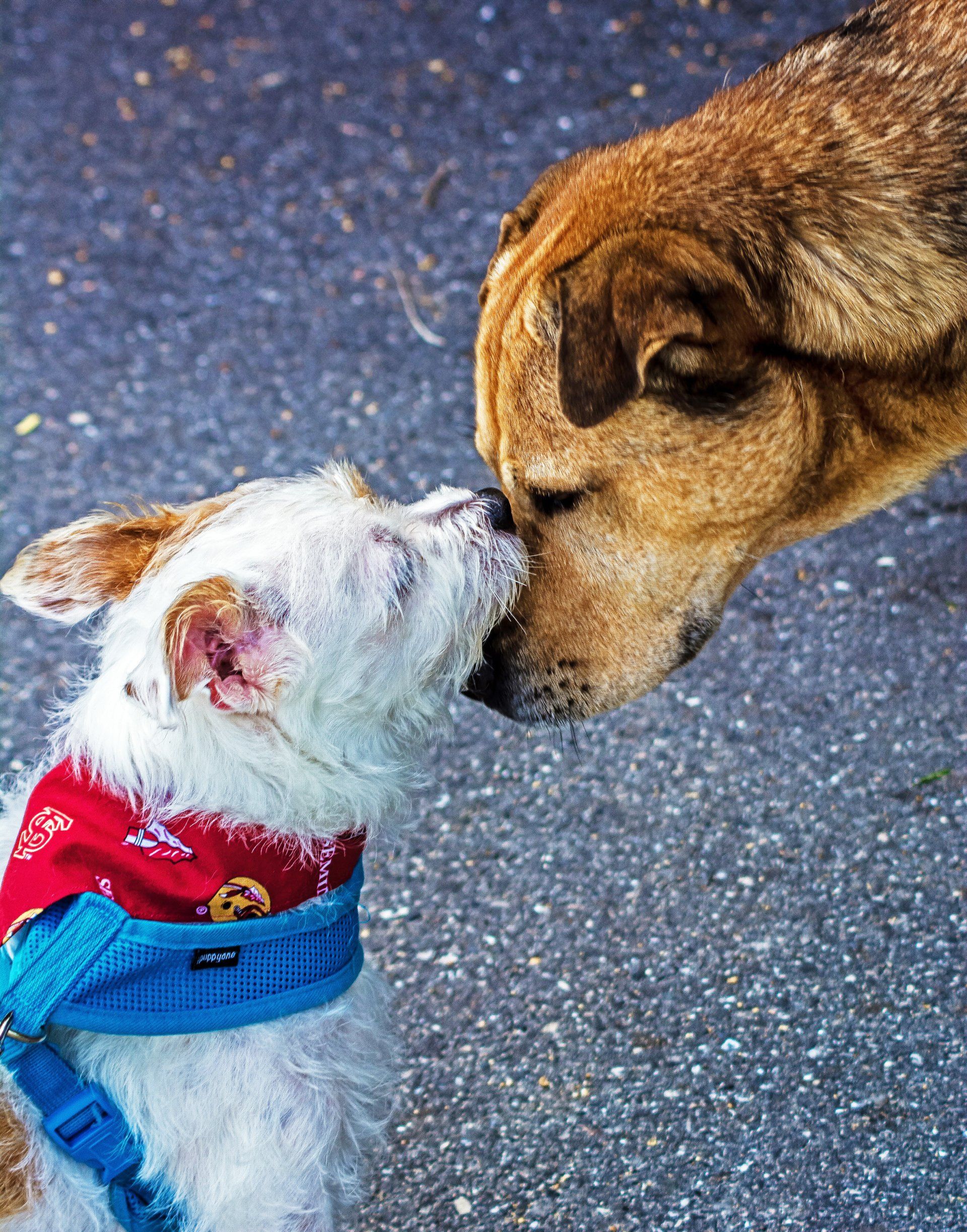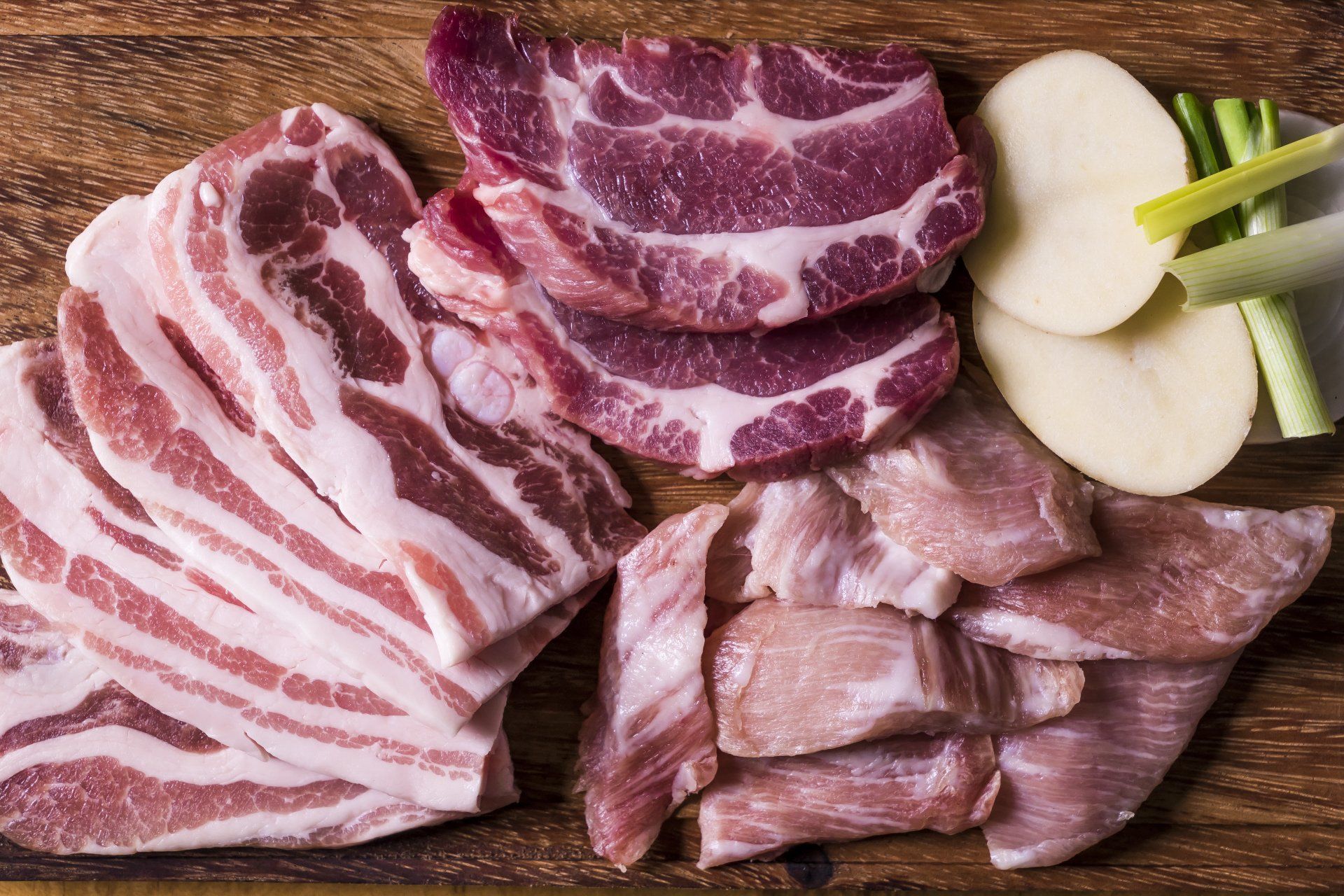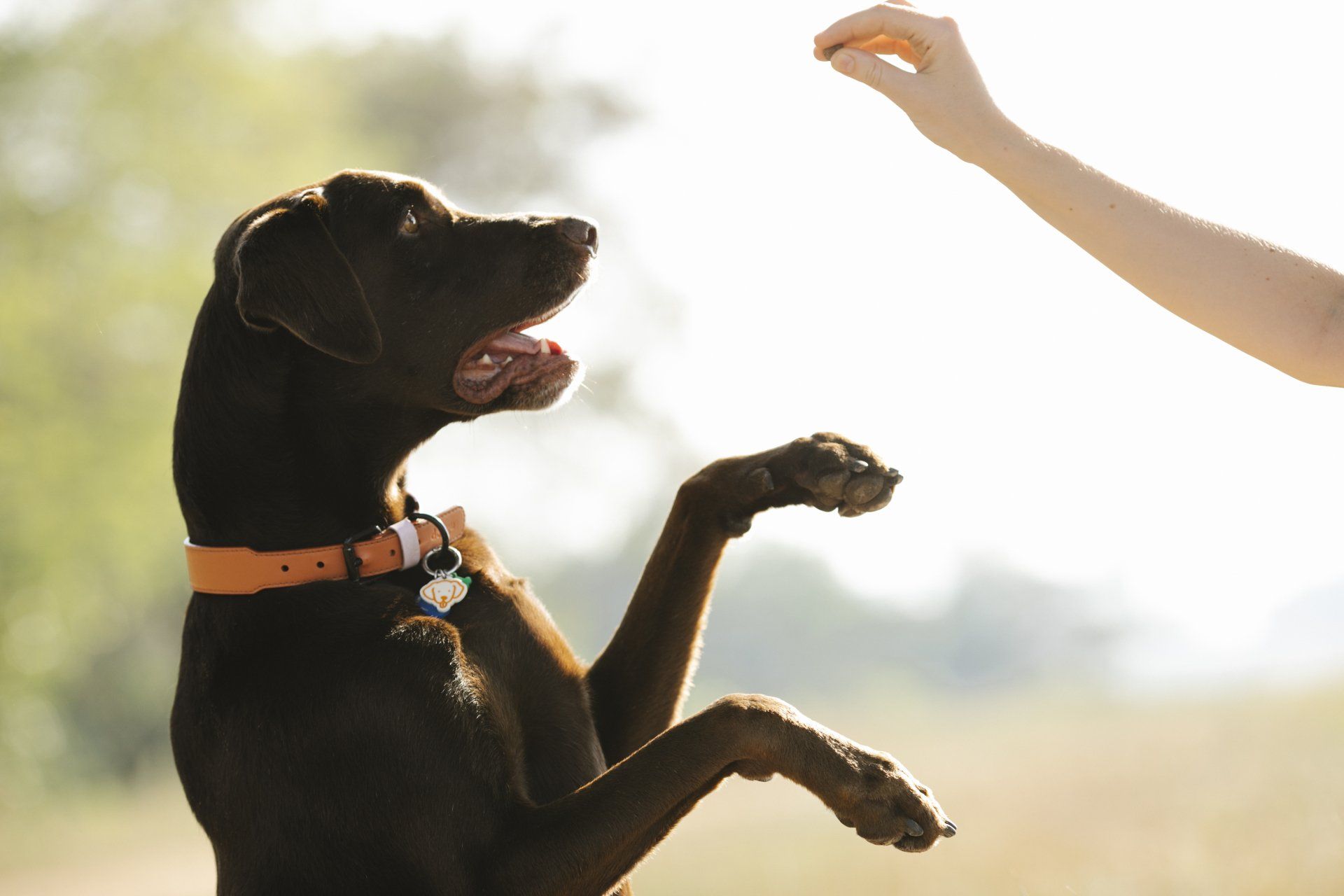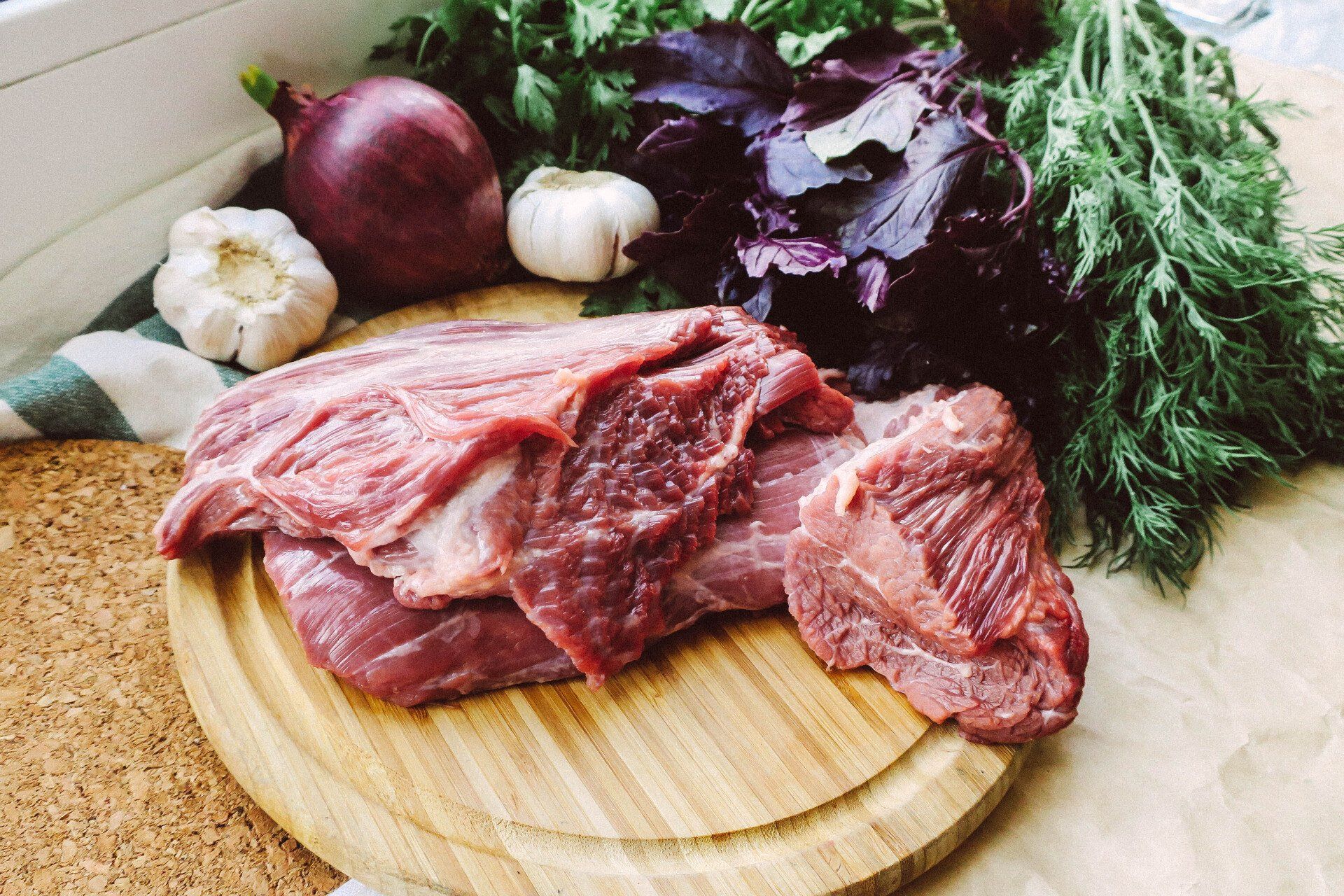Call Us +1-415-488-7734
Only Fur Paws
Premium Human-Grade Dog Food

Established to help reduce food allergies, associated,
with poor quality ingredients in dog food.
100% Human-grade ingredients.
Human grade dog food is a term used to describe food that
is edible for both humans and dogs. It is important to note
that in order for a food to be considered “human-edible”, not
only must all ingredients be fit for human consumption, the
product must also be manufactured in a “human-edible” facility
and packaged according to set regulations. Only Fur Paws
meets all standards, requirements. The composition of the
food meets or exceeds the AAFCO recommendations of
each essential nutrient.
Welcome To Only Fur Paws
Our priority is to provide quality nutrition for dogs, using human-grade ingredients. We are aware how food can be beneficial to a dog's health and invest our very best in every meal. Your dog's nourishment is our number one priority.
Food Your Paws Will Love!
Quality Nutrition
Only Fur paws
Welcome to Only Fur Paws, created from love, inspired to manufacture healthy nutritional food for dogs.
Balanced Nutrition Equals Long, Healthy, Happy Life
100% Fresh Human-Grade Ingredients
Vitamins
Eating a sustainable amount of vegetables may be one of the simplest ways to improve health and well-being.
Minerals
Minerals are important for the body to stay healthy. Ensures bones, muscles, heart, and brain, function properly.
Nutrients
Provide us with the energy, the building blocks for repair, growth and substances necessary to regulate chemical processes.
Antioxidents
Can help your immune system function more efficiently; help protect the body from damage caused by harmful molecules
The right vitamins help your dog's body grow and repair itself. Without the balance of vitamins, their body wouldn't grow or repair itself properly. Dogs need many of the vitamins people do to stay healthy, such as vitamins A, C, D E, K, and B vitamins, essential for a pet's diet. Vitamins are
Contain iron, vital for the body to function and helps provide oxygen to organs and muscles. Also contains Selenium an antioxidant that helps prevent oxidative damage that can cause premature aging, cancer, and inflammatory diseases.
Nutrients can be derived from, fruits, and vegetables. These foods can be a valuable source of essential vitamins, minerals, and fibers. Nutrients are important for health development.
Antioxidants neutralize the effects of chronic inflammation, which is a feature of a variety of problems in dogs. Antioxidants build up you dogs defenses. to keep your dog happy and healthy, they need to be consuming plenty of antioxidants.
Proper balance of nutrients is essential when feeding your dog
Vitamins in Only Fur Paws
The right vitamins help dog's body grow and repair itself.
Vitamins assist your dog's body process of other nutrients.
without the correct balance of vitamins, their body wouldn't
grow or repair itself properly. Only Fur Paws provides the
correct balance of essential vitamins in your dog's meals for
nutritional health.
Dog's need vitamins from two different group:
from vitamins C and B-complex, which, are water- soluble.
Vitamins A, D, E, k, are fat-soluble.
Water-soluble vitamins C and B-complex.
These vitamins help a dog build, bones, teeth, and connective
tissues.
Vitamin C
Vitamin C is a natural nutrient in the body. This vitamin not
only provides the necessary nutrients to help form muscles,
cartilage, and collagen, but also works as an antioxidant to
protect the body from free radicals. Free radicals are
molecules in the body that are potentially harmful and can
damage things like cells or DNA codes, causing serious problems
down the line. Vitamin C is a water-soluble vitamin. This means
it doesn't require fat cells for storage of absorption. Instead,
it can dissolve in water and easily absorbs into the body.
These vitamins are dissolved in water, and are continually
being flushed out of the body, so more may be needed for
the full quantity amounts.
Like human's dogs need vitamins to. In its natural state,
Vitamin C is extremely good for your dog and provides them
with many health benefits. It helps your dog as an antioxidant
in their immune system, but the AKC notes it can improve with
cognitive aging and decrease inflammation.
If you're feeding your dog a complete diet, you won't have to
supplement.
B Vitamins
B Vitamins are a group of important vitamins that play a key
role in a dog's health. A water-soluble compound often
presents in food that humans and dogs consume. It has
many functions such as promoting a healthy metabolism as well
as keeping cells in check. Vitamin B complex acts as a co-enzyme
promoting biochemical reactions to change carbohydrates into
glucose providing energy to the body. Vitamin B is necessary
in a dog's diet for the assimilation of protein and fat. Helps
with chronic skin and digestive... These vitamins are needed
for the body to break down. Strengthens the body's
immune response. Important for the function of brain activity.
Contributes to muscle system maintaining strength. Helps support
eye health. B group vitamins are essential for a dog's organism just
as other vitamins. A good quality diet is the best way to
ensure. The correct supply of vitamins for dog's
Vitamin A
Vitamin A is necessary for all humans and dogs. The vitamin is fat-
soluble and found in many foods. Vitamin A is stored in the
fat cells of dogs, where it helps with many bodily processes,
from mucus production to cell growth and division. In all stages
of a dog's life they will need vitamin A for their bodies cannot
properly function without it. Vitamin A is essential and helps
maintain nearly every organ system, from skeletal to the
reproductive system. Though most well known
for the support of vision and skin health, it functions go
well beyond that. The need of vitamin A starts in the Utero,
where it is important for the development of brain and skeletal.
Contributes to the prevention of dogs from getting sick for it help
power the immune response, assisting to create the mucus that
lines the lungs. As well as supporting the immune system by making
white blood cells which circulate the body and search for foreign
invaders and cellular irregularities. Vitamin is important in helping
bodies fight off infection from viruses and bacteria.
Vitamin D
Allows your dog to balance minerals such as phosphorous and
calcium for healthy bone growth. Assist in repair of bones after
damage or exercise, dental health, immune system regulation,
vision and muscle growth. Without vitamin D, your dog would not
be able to develop properly or maintain healthy muscles and bones.
Vitamin D is important molecule for healthy people and dogs.
Vitamin E
Vitamin E is significant for humans as is important for dogs.
Vitamin E is essential for dogs it can heal injuries. Makes joints
and muscles healthy. Contributes to avoiding further damage to
cells. Is good for a dog's skin and also make the coat of the
dog soft and shiny. Has anti-inflammatory
benefits and can reduce painful symptoms of arthritis. Elderly
dog's with stiff and painful joints can benefits from the vitamin.
it's an antioxidant that helps protect cells from damage as well
free radicals. As well as keeping the immune system healthy;
muscles, heart, liver nerve cells, and skin.
Vitamin K
Green leafy vegetables are rich in vitamin K, such as broccoli
and Brussels sprout. A nutrient dogs need to stay healthy.
Benefits of this vitamin improved blood clotting and reduce risk
of bone fracture. plays an important role in bone and heart
health. Involved in maintaining brain function also
helps promote healthy metabolism. Vitamin K is most
responsible for bone building and blood clotting. Blood would not clot
without this vitamin for it activate the protein that is responsible
for the formation of clots within
the blood.
Quality Sourced, Balanced Meals for Health
Minerals in Only Fur Paws
Does the food contain enough essential minerals for dogs? Today it is difficult to answer these questions. It is known that not all food contains the necessary minerals, so the animal’s diet should be supplemented with vitamins and microelements. There is no need for supplementation with Only fur Paws, our meals are well formulated with all essential vitamins and minerals. Dogs need calcium, phosphorus, sodium, potassium, iron, zinc for the normal metabolism of their body. All this is found in Only Fur Paws. It is not enough to feed a dog with one food — it can cause various diseases and deterioration of health. Every day, give your pet a balanced composition of vitamins and minerals. That will contribute maintaining the health of the animal.
Minerals Are Essential to Dogs’ Health and Their Function
Minerals are the main substances found in cell tissue, muscles, bones and teeth. They’re essential to our health because they maintain fluid balance, electrolyte balance, bone health and body structure. Minerals also regulate nerve impulses and muscle movement throughout the body. They help to activate enzymes that promote growth and development. The Canadian Veterinary Medical Association (CVMA) considers minerals as some of the most essential nutrients for dogs. Whether we know it or not, we all use and depend on minerals daily. They’re in every food we eat and in every water we drink. That is valid for every organism, including dogs. A dog’s diet must include all essential minerals in appropriate amounts. They provide the body with energy, boost the immune system, regulate heart rate, maintain body temperature and preserve bone health. Minerals are also necessary to produce red blood cells that carry oxygen throughout the body, which is of paramount importance. Without minerals, dogs cannot survive for long periods because it weakens their immune system, probably making them susceptible to diseases and eventually death. Let’s review some general information about the most crucial minerals for dogs.
Calcium for Dogs
Calcium is the most abundant mineral found in bones and teeth. It’s also essential for a strong body and skeletal system. It has a significant function in the formation of blood vessels and nerve impulses. Calcium helps to regulate heart rate and relaxes muscles. All these facts make it a vital mineral for dogs to have an adequate intake daily. A calcium deficiency causes muscles to tighten up. Also, we can see some changes in the body’s metabolism that can lead to an increased risk of bone disease or health problems such as arthritis.
Having a healthy supply of calcium is essential for both the health of your dog’s bones and teeth. Dogs also need calcium to help regulate blood circulation and maintain body temperature. Dogs with large dimensions and short gut have a higher risk of bone disease from not consuming enough minerals. Dogs have a higher risk of getting bone diseases because their skeleton is so massive in proportion to their body weight, so they can’t afford to lose much calcium. Calcium should be present in nutritionally balanced dry food, not less than 800 mg/kg and not more than 2 g/kg. Calcium should be actual in calcium chloride or crystal calcium supplement before feeding your dog food.
Phosphorus for Dogs
Phosphorus is the second most abundant mineral in your dog’s body. It’s present in every cell of the body — it is necessary for the production and maintenance of bones, teeth and muscles. Phosphorus also regulates the production and release of energy from food through a process called cellular respiration. It helps to support strong muscles. It also aids in the absorption of calcium. Phosphorus has a crucial role to play in your dog’s bone growth and maintenance, so it should be included in their diet. The deficiency of phosphorus in dogs leads to rickets, a lack of calcium and an increased risk of arthritis. Rickets is a disease that makes the bones weak and soft. If your dog eats once a day 30 grams of dry food, you need to take into account 1 — 2 percent phosphorus. The share of phosphorus in food should be lower than 1% to prevent hypercalciuria while exceeding it can lead to the development of osteoporosis.
Magnesium for Dogs
Magnesium is usually branched into two main types: calcium bonded magnesium or magnesium bound to oxide. Magnesium is involved in over 300 chemical reactions in the body, including muscle contractions, heartbeat and nerve impulses. It’s essential for healthy bones and teeth. Magnesium works to maintain a normal heart rhythm, muscle strength and energy levels. It can also help protect against osteoporosis (thinning of the bones). When magnesium levels in your dog’s body are low, their muscles can become weak, they can have stomach pain or diarrhea, they may not be able to consume water well, and they may also develop problems with their eyes.
Iron for Dogs
Iron deficiency is a common problem with dogs. Most dog foods contain less than 5 percent of the daily requirement of iron which is too little. Dogs need iron to carry oxygen around their bodies, so they must have a balanced diet that includes natural sources of iron such as meat and green vegetables. Dogs have a limited ability to absorb iron from their food. So they must have a balanced diet — high in protein and carbohydrates. Iron is also crucial for the immune system and antioxidant protection against free radicals.
Copper for Dogs
Copper is an essential mineral, and it’s a significant part of red blood cells. Copper helps to maintain a healthy immune system and thyroid gland function.
It also works to synthesize DNA and cell division, and it’s involved in the production of energy, including insulin production. One of the most important functions of copper is its involvement with iron absorption, as it helps to carry iron through the blood. Therefore, a copper deficiency can cause anemia and can lead to decreased red blood cell counts.
Selenium for Dogs
Selenium benefits the thyroid gland and also helps to regulate inflammation in the body. That can be why it’s linked with various skin conditions.
It’s also a part of the antioxidant process, so it can help to protect against free radicals. Selenium is urgent for bones since it helps to increase bone density and maintain good bone health. Selenium helps to produce antioxidants, which protect your dog’s cells. Selenium is also found in Selenoproteins that are necessary for the body’s immune system. As selenium levels decrease, the immune system works harder to fight off infections, and it can leave your dog vulnerable to skin conditions and inflammations.
Make Sure Your Dog Is Getting All the Minerals They Need
If you want your dog to stay healthy and happy, they need a balanced diet. That can be especially difficult if their food doesn’t have all the necessary nutrients. But don’t worry, it’s simple to make sure this is happening at home! Just follow these three easy steps:
- Check the label of the food item by looking for the requisite certifications.
- Don’t forget to visit your vet regularly while your pup is still young so they can make sure everything is going smoothly with their health.
- Don’t forget to make sure they get plenty of exercise!
Sometimes a balanced diet is hard to achieve and maintain. That is why we have developed Only Fur Paws.
Your vet should always be the first one to ask, but you should also follow through with doing some research on trace minerals for dogs. Several things influence how to make sure your dog is getting all the minerals they need.
We’ve done our research and believe that our product is the one of the best out there.
The Takeaway Give your pets the best foods regularly so you can be sure of their longevity. Only Fur Paws is formulated with minerals that are known to be essential nutrients for dogs. Calcium and phosphorus are essential for maintaining strong bones and teeth. Canines need magnesium and potassium for their nerve impulse transmission, as well as muscle contraction and cell signaling.
Our premium minerals for dogs are designed to help benefit your four-legged friends by helping to:
- Support their cells and nerves.
- Strengthen their bones and muscles.
- Fortify the immune system.
- Facilitate to help ensure that your pet receives sufficient levels of selected ingredients, including calcium, phosphorus, magnesium, iron, zinc, strontium, manganese, potassium, iodine, chromium, selenium and copper.
Natural Whole Foods
We specialize in providing healthy balanced meals to reduce severe food allergies through nutrition.
NO Kibble, No Raw
1.
- Kibble Is Fake, Dead Food!
Kibble is processed at high temperatures. The heat kills what little nutrition there is in the original ingredients. So they add in a bunch of synthetic vitamins and minerals … then they can call it “complete and balanced.” Synthetic vitamins and minerals aren’t well absorbed by your dog’s body … and can be harmful long-term.
Kibble doesn’t provide your dog with good nutrition.
2.
2. Kibble Is High in Starchy Carbohydrates
That’s what holds those little kibble pellets together. Your dog doesn’t need starch in his diet. Starch creates an unhealthy gut, causing digestive and other issues. It leads to long-term chronic conditions like allergies and skin problems.
3.
3. Kibble Is Bad for Your Dog’s Teeth
Contrary to what kibble makers tell you kibble does not clean your dog’s teeth! Because the food contains no live enzymes or natural nutrients, and all those starches stick to the teeth kibble leads to dental issues.
4.
4. Kibble Contains Carcinogens
This is the most important reason of all to avoid kibble. Kibble contains toxins … like aflatoxins, heterocyclic amines, acrylamides and PBDEs (flame retardant chemicals!). These are harmful chemicals your dog shouldn’t eat!
All these problems are just as bad in all kibbles. Even “premium” kibbles and expensive veterinary prescription foods!
So do your dog a favor and get him on a whole food, preferably raw meat-based diet. It might seem expensive and will be more time consuming for you…but you’ll probably save with lower vet bills.
Instead, for your dog’s health - Feed Fresh Food
If you can’t quite bring yourself to feed raw … feed a whole food, cooked diet.
You can also feed a freeze-dried or dehydrated food if you want convenience.
The journey to your dogs health starts and ends with the diet you choose.
Raw Diets Dangerous for pets and people
In a new study published in the journal Vet Record, researchers found that raw meat diets contained numerous types of bacteria that can be dangerous to both humans and pets, including Salmonella. Researchers in Europe tested 60 different packages of raw meat diet food for dogs from 10 different manufacturers and found potentially harmful bacteria in every single one.

feeding your dog scraps.
Enterobacteriaceae, known to cause diarrhea and intestinal distress, are commonly an indicator of fecal contamination. They were found in all 60 samples. More than half of the samples exceeded the Enterobacteriaceae safety standards set by EU regulations. Researchers also discovered Campylobacter, Salmonella, and Clostridium perfringens in the samples. Campylobacter was found in 5 percent of the samples. It’s one of the most common causes of food poisoning in the United States. Salmonella species were present in 7 percent. The bacteria are responsible for around 23,000 hospitalizations Trusted Source in the United States each year.
Unlike other bacteria found in the samples, such as Enterobacteriaceae, which have a threshold for safety, Salmonella has a zero-tolerance policy according to EU regulators. This means that if it’s found in food — for animals or humans — it can’t be used.
C. perfringens, another indicator of fecal contamination, was found in 30 percent of the samples, with two of them exceeding the safety threshold.
“This and several other peer-reviewed studies have shown raw and undercooked animal-source protein can contain pathogens that are harmful to animal and human health, particularly the very young, the elderly, and immunocompromised individuals,” said Michael San Filippo, MLIS, a spokesperson for the American Veterinary Medical Association who wasn’t affiliated with the study.
“The AVMA has a policy advising against the feeding of raw or undercooked animal-source protein in dog and cat diets,” he added.
The bacteria found in the study have the potential to make both animals and their owners sick, especially if you let your dog give you the occasional wet kiss on the face.
The study authors conclude that not only do the bacteria and juices from the meat have the potential to splash around during mealtimes, but that dog “kisses” and other close contact are a great opportunity for the transfer of pathogenic bacteria.
“The results obtained in this study show that it is highly important to handle [raw meat diets] carefully and to maintain good hygiene due to the potential risks these feeds pose to human and animal health,” Ingrid Hansson, DVM, one of the study authors and a senior lecturer in bacteriology in veterinary medicine at Swedish University of Agricultural Sciences, told Healthline.
Bacterial infections can be serious. For many, including dogs, they could manifest as stomach or digestive problems. But they can be harmful and even fatal for the elderly, young children, and the immunocompromised, who are more susceptible to infections.
Studies of raw pet food also have shown bacterial contamination. The FDA issued suggestions in 2004 for manufacturing raw pet food more safely, citing concern about the possibility of health risks to owners from handling the meat. Studies done by the FDA's Center for Veterinary Medicine have found that raw pet food was more likely to contain disease-causing bacteria than other types of pet food that were tested. If you feed your pet raw pet food, the FDA recommends that you thoroughly wash your hands with soap and water for at least 20 seconds after you handle the pet food or touch anything that the raw pet food touched and disinfect those surfaces.
quality is In Only Fur Paws
Wholesome foods so there's no need for supplements
Such high quality that humans can eat their meals.
We put our best into each meal.
Quality Sourced Ingredients
Meets AAFCO daily requirements
Bringing awareness to the
importance of nutrition for dogs.
A balanced diet is just as important for dogs as for humans. In the same way, processed human food is bad for us and often deprives us of essential nutrients, and so does processed dog food.
A diet with fresh green vegetables and fruit can contribute to healthy paws
Fresh food is the healthiest thing a dog can eat



















